The mountaineer Aretha Duarte gained media attention in 2021 when she became the first Black Latin American woman to climb Mount Everest. Behind this grand and challenging personal achievement, Aretha had a goal: to expand opportunities in nature activities for both Black people and also for women.
Raised in the poor area, in suburbs of Campinas, Aretha was the first in her family to attend college, which for her represented breaking a structure. During her degree in physical education—a course she chose because she believes in sports as an educational tool—Aretha attended a lecture about mountaineering.
The guide and athlete was 25 when she felt a mix of emotions upon discovering the sport: “I was upset because it was the first time I had ever heard of mountaineering, but at the same time happy because finally I had the chance to access a nature sport that seemed really interesting. I got excited about practicing trekking and expeditions.”
To follow this path, Aretha asked for a job at the company that gave the lecture and entered the mountaineering world professionally. “It took some resilience for me to be accepted in that environment. I started as a saleswoman, but I wanted to be out in the field. I began working as an assistant guide in Brazil and abroad, and finally became a high-altitude specialist guide.”
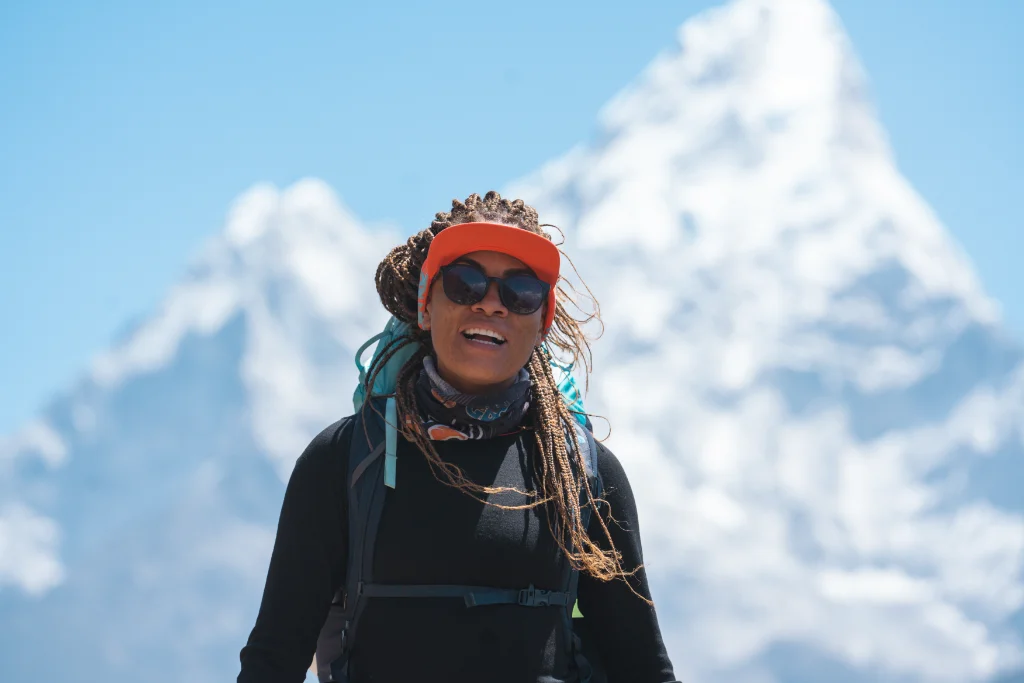
Everest Basecamp, April 2025 – Photo: Gabriel Tarso
Since then, Aretha has continued to actively inspire others. Her purpose is to impact and transform lives through inclusion. “Today, I have visibility within this niche, but I am not interested in being the only one.”
Like Aretha, Ariel Silva, who has summited 8 of Brazil’s 10 highest mountains, as well as feats in Argentine Patagonia and Venezuela, does not want to be seen as an exception. His wish is to serve as an example and inspiration for the Black community. “I don’t like being seen as a young Black man who does outdoor activities. I want to be Ariel the climber, who hikes and, through that, shows young Black people without resources that it is possible,” says Ariel, born in the Maré community in Rio de Janeiro, a tour guide and founder of the Montanha Sagrada (Holy Mountain) agency .
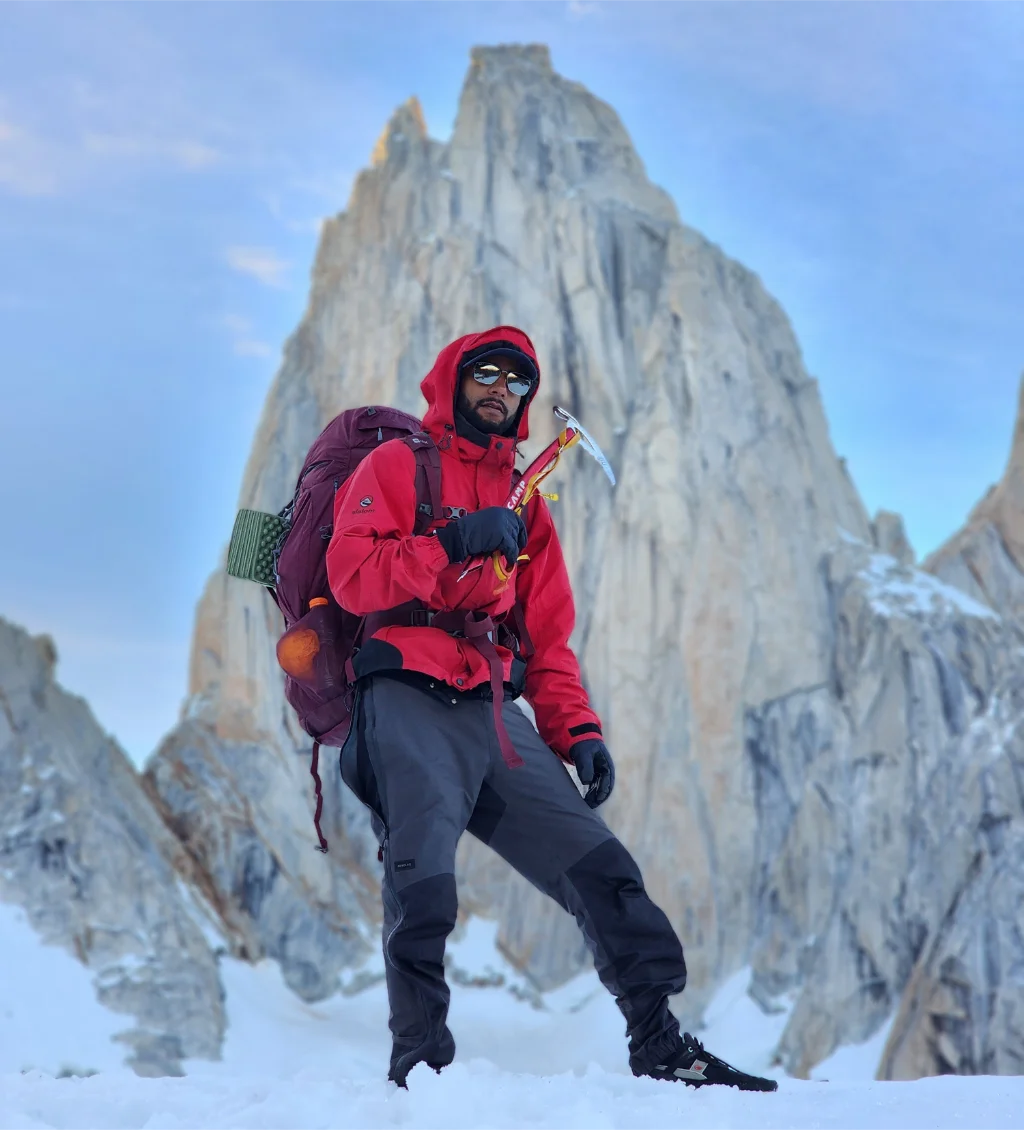
Ariel Silva – El Chaltén – Argentine Patagonia
What Prevents the Inclusion of Black People in Outdoor Activities
As contradictory as it may seem, in a country like Brazil, where the majority of the population is Black or mixed race, many nature activities like mountaineering are still dominated by white men with a traditionalist view, according to Carla Romão, mountaineer, social scientist, and technical director of CERJ (Clube Excursionista Rio de Janeiro – one of the clubs affiliated with FEEMERJ).
“Our biggest challenge within this racial perspective, in my view, has been sharing this space. If I’m in an environment where not even half or a third are Black people, that environment has a very serious problem,” says Carla.
Access to mountaineering, climbing, and trekking is limited to specific groups due to socio-economic and cultural factors, according to Aretha Duarte. Her journey to Everest was a call to build bridges between companies, governments, and civil society to create more inclusive opportunities. “I understand it is everyone’s responsibility—not just the Black person’s. They also want it, but the opportunity does not reach them, which makes it difficult to practice these activities.”
For sociologist Denilson Silva, one of the founders of Negritude Outdoor, broadly understanding all the barriers that prevent the inclusion of Black people, those from the outskirts, and women in activities traditionally led by heterosexual white men is crucial for real awareness. “We tend to believe that solving one branch solves everything, and then you create a problematic tree. You have to look at the whole.”
Socio-Economic Barrier: A Democratic Obstacle in the Mountains
Diego Cruz grew up in the city of Franco da Rocha, in the state of São Paulo. At the time, it had plenty of green areas where he played with friends. His connection with outdoor activities came from a desire to change his lifestyle at age 24. On his first hike, at Cachoeira da Pedra Furada in Mogi Mirim, Diego reconnected with the nature he experienced in childhood.
There, a dream was born: to climb Pico dos Marins. But Diego soon faced challenges like investing in gear and logistics. “When I started thinking about the tent, shoes, food I’d have to bring, I thought about giving up. But at the time, I met some hiking groups and adapted to my reality. I didn’t have a sleeping bag but improvised blankets. I wanted to make it happen,” says the founder of the OKÊ Aventura agency and vice-president of FEMESP (Federação de Montanhismo do Estado de São Paulo).
On the adapted Marins x Itaguaré Crossing, Diego faced a direct racism incident. “I heard someone in the group say, ‘that’s Black people stuff,’ which made me and everyone uncomfortable. It triggered a lot of feelings. It’s very sad to think you can’t do things just because you can’t afford an expensive brand sleeping bag.”
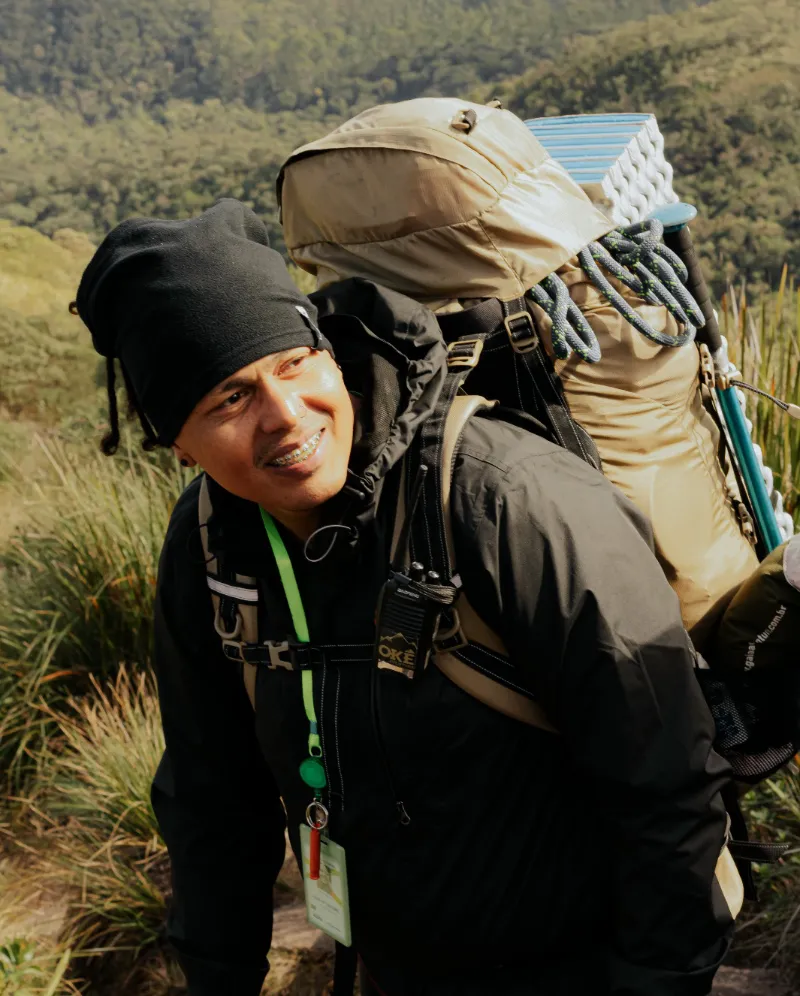
Diego Cruz
One of the main barriers to Black people participating in outdoor activities is the socio-economic factor, since equipment is expensive and many places are hard to reach, explains Ariel Silva. “A backpack costs as much as someone’s monthly rent. A climbing rope equals two minimal wages per month. While some people have the best backpacks, many use the same one they use for work.”
According to Ariel, this challenge naturally separates people and, worse, can generate aversion to nature activities. “When you feel inferior because of simpler gear, you might quit and go back to football. How can I pay for a climbing course and not buy food? I had to learn by trial and error, putting myself at risk, and through that, I keep encouraging others,” says Ariel.
Carla Romão offers an important reflection about the experiences of Diego and Ariel, the occupation of natural environments, and prejudice in the mountains when faced with socio-economic barriers. “It’s crazy to think about how the sport is organized. It’s a European model, but traditional communities, like as Quilombola (is a Brazilian hinterland settlement founded by people of African origin), and Indigenous communities have practiced what we call mountaineering since time immemorial. This imported model creates a profile. When you see Black people not so well-equipped in the mountains, you tend to think they don’t belong there. But the space is theirs too.”
Diego Cruz continues to dream big, but still faces challenges. After enrolling in a high-altitude course with the Clube Paraense de Montanhismo, he was selected for an expedition in Passo de São Francisco, Argentina. But again, he ran into financial obstacles. This time, he’s turning to friends and got support from GPM (Grupo Paulista de Montanhismo), which will help with equipment.
“I, a Black man from the slum, who grew up around people without this culture, was lucky to meet people who saw my determination and helped me. Without that, maybe I would never have even become a professional in this area.”
Invisibility, Lack of Welcoming, and a Sense of Not Belonging
Even today, the lack of welcoming and sense of belonging bother Ariel Silva in his personal and professional outdoor activities, causing constant pain. “When you’re in a place where the overwhelming majority are white people, they don’t value you until you prove you’re capable. Breaking this recognition barrier is very hard. You’ll face many blocks. That is my place, but when you feel you don’t belong there, it’s very sad, and many times you feel like leaving.”
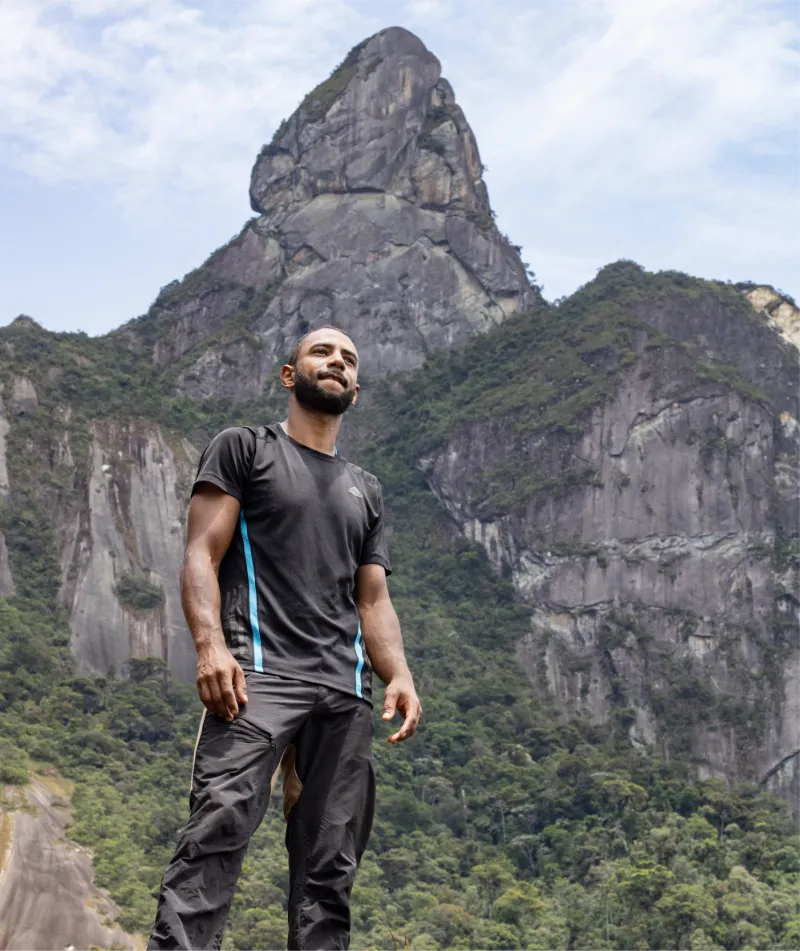
Ariel Silva
The lack of visibility was also an issue for Aretha Duarte before conquering Everest’s summit: “Before, I’d arrive somewhere and people wouldn’t necessarily recognize me as the expedition leader, because usually guides aren’t women, let alone black women. They think: ‘How did she have the time and means to prepare and specialize in this?’”
Another discomfort for the mountaineer is looking around and not seeing other Black people in the group. “When I guide clients in the mountains, there is rarely a Black person. That’s the clearest example of racism in the mountains,” says Aretha. This feeling also makes Denilson Silva from Negritude Outdoor uncomfortable: “I keep thinking: ‘Why am I the only one who can be there? Why am I the only one who has a Saturday off to do a hike?’”
For Carla Romão, this barrier is linked to silent exclusion, not direct prejudice, but subtle behavior. “You let the person join a club, for example, participate in activities, but subtly you create situations where that individual doesn’t feel comfortable. I have experienced this symbolic exclusion; it’s a kind of subtlety that tells you that you’re not welcome there.”
The mountaineer stresses that many people stay out of insistence, out of resistance, but sometimes wonder if they should keep going. “The way they push you out affects your individuality, but at the same time you want to be in the mountains. You can count on one hand the Black people in clubs. Many don’t even question their absence,” says Carla, who decided to join CERJ when she saw Zé, Black man with an Afro at the club’s door. “When I saw Zé, I felt welcomed because there was someone who looked like me in that space. He welcomed me just by existing. I decided that was my place.”
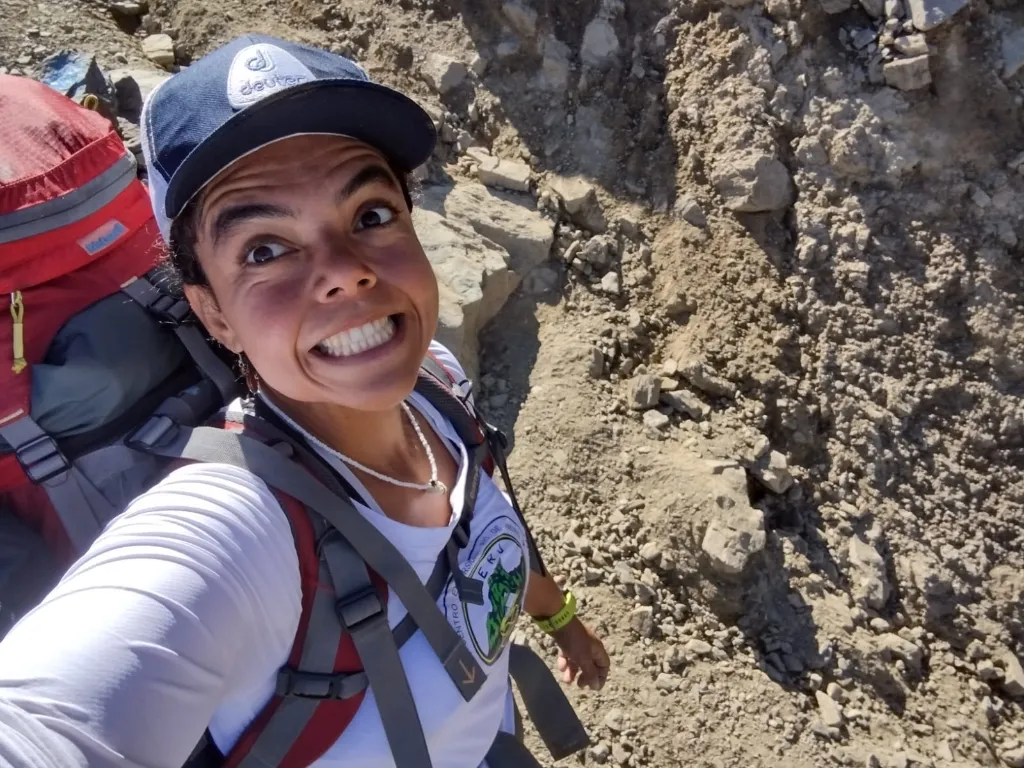
Carla Romão during a hike in Bariloche
Carla emphasizes the need to broaden the inclusion debate among responsible bodies to make outdoor activities accessible to all. “When we talk about the racial perspective in mountain environments, federations, and associations must set guidelines. We cannot ignore that sports in Brazil cannot be white; they must be at least multiracial to include all the experiences of people living in the Brazilian context. All research shows that inclusion in sports improves our outlook on life.”
Lack of Representation in the Outdoor Market and Media
“I always hear that the mountain is for everyone, but that’s not true. For a long time, we didn’t see representation, whether of professionals or in the media. It was always white people, mostly men, because they had parents who took them to these places since they were kids,” Diego Cruz
Another reason that distances the Black population from nature activities is indirectly practiced by advertising and the media. The lack of Black models in store catalogs and stories of leadership in news outlets creates distance and lack of identification. “No one says that this is not a place for Black people, but I feel that a store without Black models does not represent me,” says Ariel.
The guide says he also feels frustrated when researching a destination, as the stories are always told by white people. “Rarely young Black people from the slums are protagonists. We need to encourage these people to tell their stories so that others can see that it’s possible, that strength comes from within. We need to be more visible. Virtual and in-person exposure is the way.”
For Aretha, the lack of Black representation in mountain environments is reproduced in casual conversations, on social media, and in the media. Unfortunately, according to the athlete, photo searches in image banks for climbers and mountaineers are always the same — a white man. Never a woman, much less a Black woman. Not even a Black man.
Many posts and opinions published on social media also contribute to the lack of representation and the spread of racism in the outdoor environment. Aretha recalls a sad episode that happened on her own social media, when she proposed a reflection on climbing Everest being a racist activity. The post went viral, and heavy criticism came from misinformed and ill-intentioned people.
“Many people questioned why the mountain was racist and not democratic, since it ‘allows’ you to be there. Yes, it is there for everyone, but the big issue is access to be there. The way society is structured does not allow equality of access and opportunity. That is the main issue.”
The episode made Aretha realize how behind we are in understanding the historical and cultural context of our roots and the achievements of the Black community. “There are people who still don’t understand the limitations that have existed for hundreds of years and cannot comprehend that Black people have been trying for 500 years to reach the same kind of rise and occupation that was given to white people in the past. There is a lot of history to study.”
How to Encourage the Inclusion of Black People in Outdoor Activities
Negritude Outdoor: Connections and Visibility for Black People
“The main role of Negritude Outdoor was to create a support network to know what’s happening, to show that we exist, what we need to do to protect ourselves from racial distancing practices or racism. A place for people to breathe, doing what they love with people they love,” Denilson Silva.
Denilson Silva and Leo Ferreira founded Negritude Outdoor after a conversation about Black representation in outdoor activities. “At that moment, a bell rang that I knew few people. Some family members do these activities, but even my outings were with white people. We started looking, and it was hard to find Black people. In a country with such a large percentage of Black and mixed-race people, not finding characters easily was really weird.”
Today, Negritude Outdoor connects Black people from all over Brazil to hike together and promotes discussions and lectures on racial topics. “On our outings, while we hike, we bring up our issues. When we stop for a snack, we talk about our work and other topics as Black people. The trail is the place we like to be, but nature becomes another place. There, we feel at ease.”
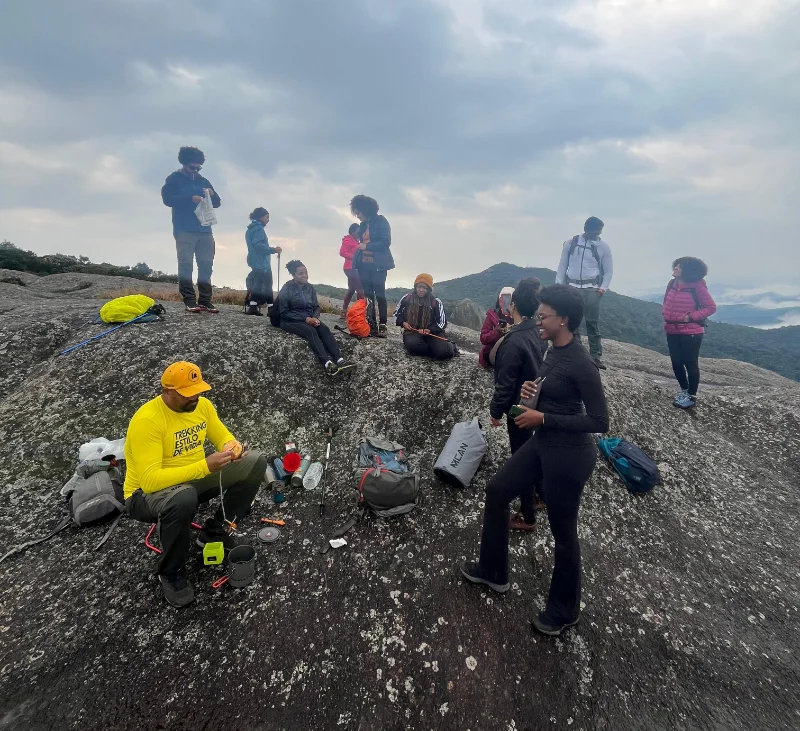
Photo: Negritude Outdoor collection
Diego Cruz is a member of Negritude Outdoor and emphasizes the need to bring mountain culture to those who don’t have access. “When we organize in groups and encourage nature activities, we bring visibility to people who don’t know the outdoor world. The goal is for them to see it and think, ‘why can’t I?’ That way, we break some barriers. The space created by Negritude Outdoor is safe, where we talk about our worldviews, experiences, and uncomfortable situations we’ve faced.”
Negritude Outdoor also has a hub that gathers outdoor professionals — a way to connect enthusiasts to Black guides and promote their work. “On our outings, there’s a constant reflection: many Black people don’t join well-known hiking groups because they think it’s too different from their race and social class reality, and this creates a block. They see destinations in the media but don’t see themselves in these groups. So they look for groups with more black people and don’t find them, which creates another block. And then the person never goes again. Negritude Outdoor promotes this connection.”
Urban Climbing Center: Climbing as a Foundation for Transforming Lives
The Centro de Escalada Urbana (C.E.U) — Urban Climbing Center — is a community initiative created in 2010 to make climbing accessible to young people from Rio de Janeiro communities. Through sport, the project has transformed the lives of hundreds of young people aged 13 to 17.
Leading C.E.U today is Katia Agatha, 21, who had her first contact with the project at 16 through a holiday camp — her entry point to becoming a regular student and later a young instructor.
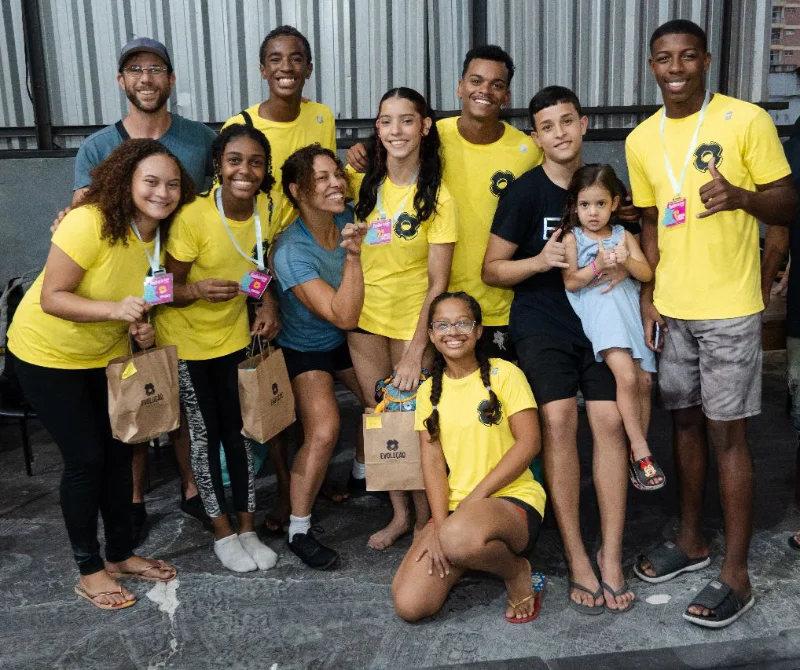
Photo: Urban Climbing Center (C.E.U) collection
Katia dreamed of studying social sciences and had her life changed by the project. “I was really discouraged, thinking college wasn’t for me. I live in the Turano community in Rio de Janeiro and always went to public school at night. That reality was very far from me, and I questioned why I should dream.” Encouraged by the coordinator at the time, Katia took a community prep course and realized it was possible to follow new paths. “C.E.U changed my thinking and how I saw myself.”
As the current project coordinator, Katia works directly with students and their parents, understanding their needs. In addition to organizing climbing classes at a gym in Botafogo (a neighborhood in Rio de Janeiro), she leads cultural, sports, and environmental outings and workshops that introduce young people to new professions. The project also offers a basic rock climbing course with certification and includes new climbers in festivals and competitions in various states.
“Climbing is the gateway to work on other issues that are part of young people’s lives. Sport is a catalyst. We want young people to get to know their city better and understand they can go everywhere. We plan outings based on what they ask for, thinking about what would be interesting for them to explore.”
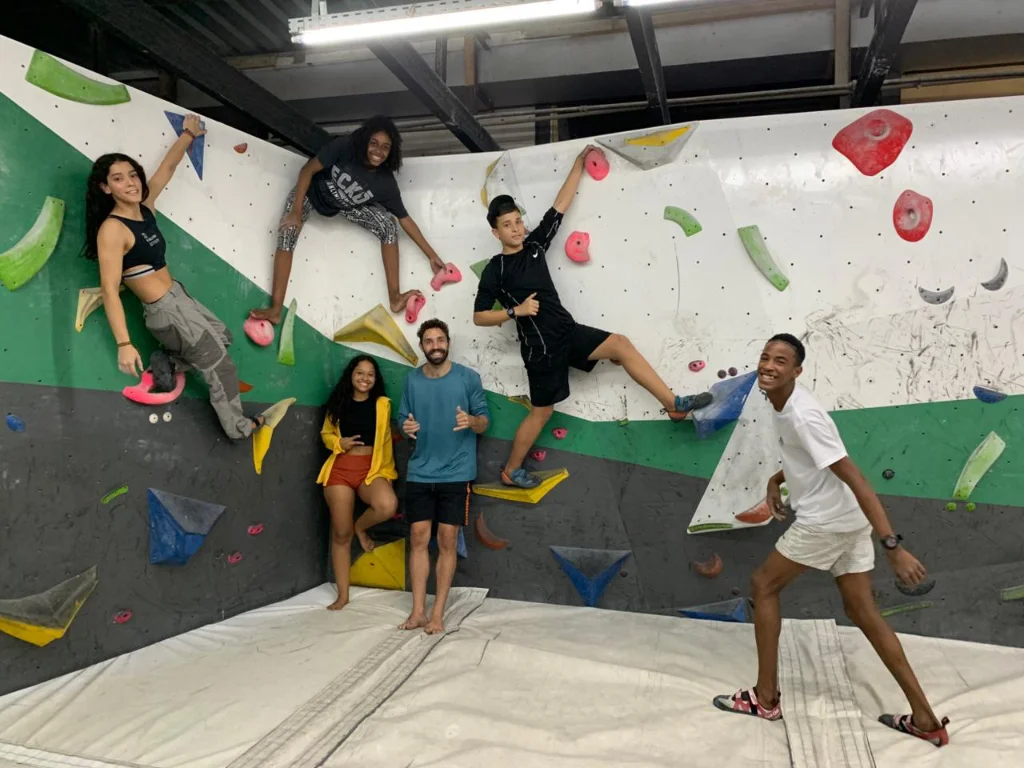
Photo: Centro de Escalada Urbana (C.E.U) archive
Through its activities and Katia’s inspiration, C.E.U’s mission is to help young people not give up on their dreams. “Many don’t know how to answer what their dream is or lower their expectations to match their reality. Through climbing, discovering new places, we show them they can occupy other spaces and do many things. C.E.U strengthened me, and we want to multiply that strength.”
Favela Radical: Nature Sports as a Tool for Inclusion and Prevention
“Nature transformed my life, and today I transform lives by fulfilling my dream. I believe a different world is possible because we have natural resources as a work tool.” — Jefferson Quirino.
Favela Radical crosses paths with the life story of its founder. Born and raised in Morro do Turano, Jefferson Quirino had a troubled adolescence, went through the prison system, and experienced the scarcity of opportunities in the community.
In 2010, after leaving prison for the last time, he decided to break the cycle once and for all. He worked at Jornal do Brasil and, while researching the local archive about his community, felt uncomfortable. “I wanted to see how the newspapers covered my territory’s reality. I realized they only talked about violence and negative things. I thought: ‘This is Turano, the favela where Jorge Ben Jor (a famous Black Brazilian musician) was born — how can they only talk about crime?’”
The turning point for changing his life — and years later, his community — came in 2014. A surfer friend just back from France gave him a surfboard as a gift. There, Jefferson understood he had a powerful tool to redefine his reality and that of others. The idea of creating a social project took shape after he worked at SESI, during a pacification process, and gained knowledge about his community’s social demands.
In 2017, Favela Radical was born, offering surfing, climbing, and skateboarding lessons, and has impacted more than 700 children and young people aged 7 to 17. “The project was created to develop sports in the favela and ensure stories like mine are no longer repeated. It stops being reparative and becomes preventive. We radically transform our territory in a radical favela, in a revolutionary way, offering activities and actions uncommon in these places. Here, the residents are protagonists.”
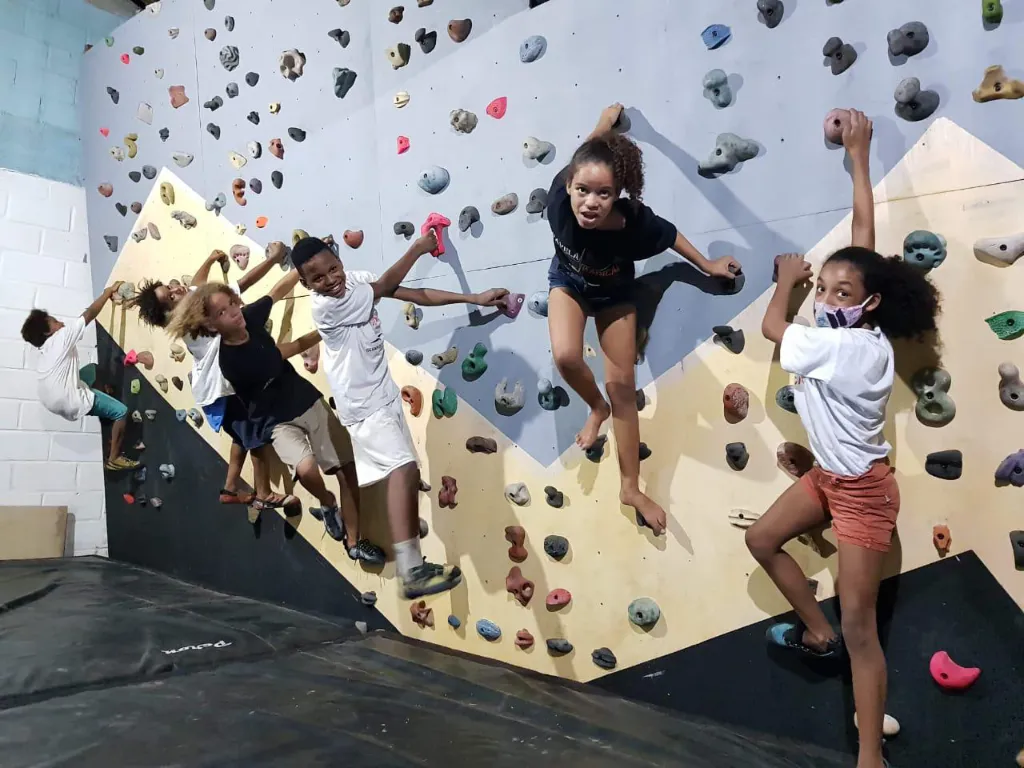
Photo: Favela Radical archive
Jefferson says climbing has always been present in the favela, but in an unstructured way. The project gave young people the opportunity for equipment, safety, and guidance to properly develop an organic skill. “Since childhood, they climb walls chasing kites, trees for fruit. From a sports perspective, climbing can be seen as elitist, but practically, it’s 100% democratic.”
Besides using the climbing wall installed in the community, Turano’s youth also have outdoor experiences through an ecosystem of partners created by Favela Radical. “C.E.U is our big sponsor, and we use their gym. Aretha Duarte is our ambassador, and Outward Bound Brasil (OBB) organizes socio-emotional experiences in nature for our youth, with the Projeto Azimute. Earlier this year, we did a trekking expedition in Serra da Mantiqueira (in São Paulo state) and soon 15 kids will go canoeing.”
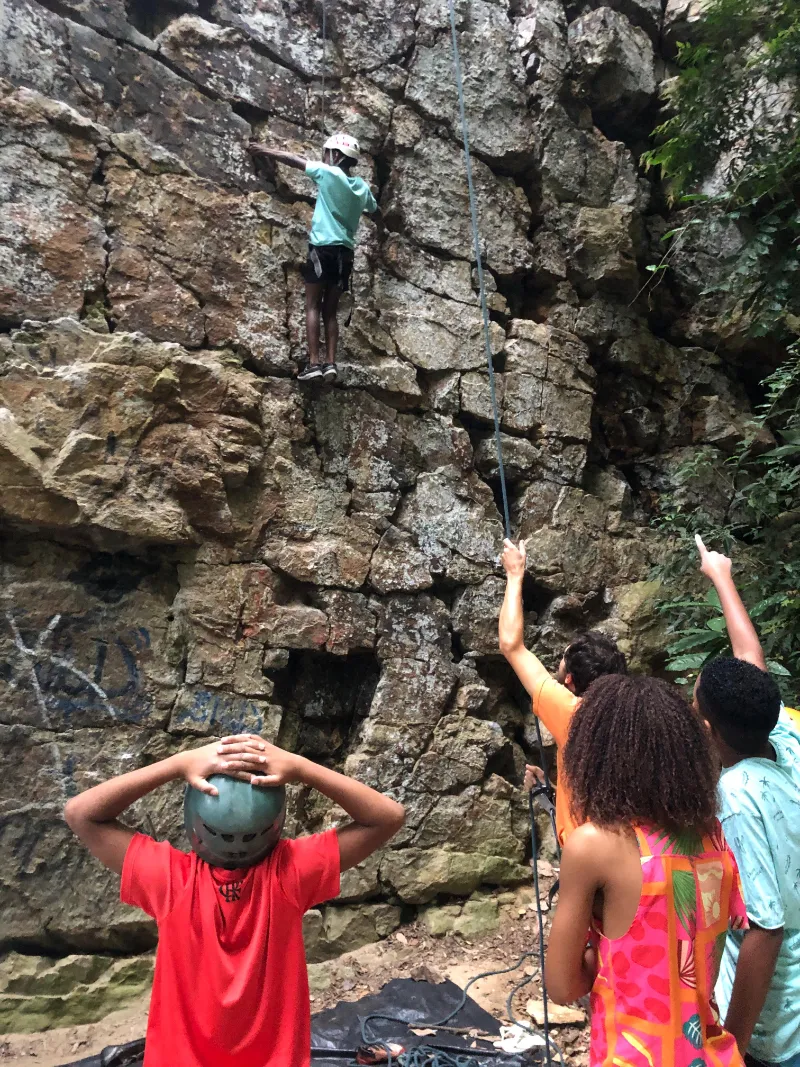
Photo: Favela Radical archive
Environmental education is also a strong pillar in Favela Radical’s curriculum, reinforcing the concept of minimal impact. “We need the sea, trails, and squares clean, without illegal waste disposal. The kids learn that environmental preservation applies to all areas of life, like proper garbage disposal at home and the school cafeteria. We show them that a candy wrapper thrown on the street ends up in the sea, a plastic cup on the trail harms animals, and that, on the other hand, if disposed of correctly, waste can become trophies and surfboards.”
By transforming his own life, Jefferson continues his dream of impacting more people with his experience, dedication, and attention to the new generation. “Nature has no color, no social status, and doesn’t care about your ZIP code. I like to see it as a welcoming, transformative, and healing space. If people knew its impact on our lives, in every sense, they wouldn’t question whether they should be there or not. They would just be.”
Aretha Duarte’s Work to Inspire Young People
“I truly believe in activating a power I call raw inner power, which for me is the potential to dream and achieve. Activating the potential each of us has to accomplish great things.” — Aretha Duarte.
To turn her achievements into collective results and bring opportunities to more people, Aretha Duarte, in addition to supporting Favela Radical and OBB’s Projeto Azimute, is an ambassador for Pés Livres (Free foots) in Tanzania, founded by Brazilians to support local children and youth.
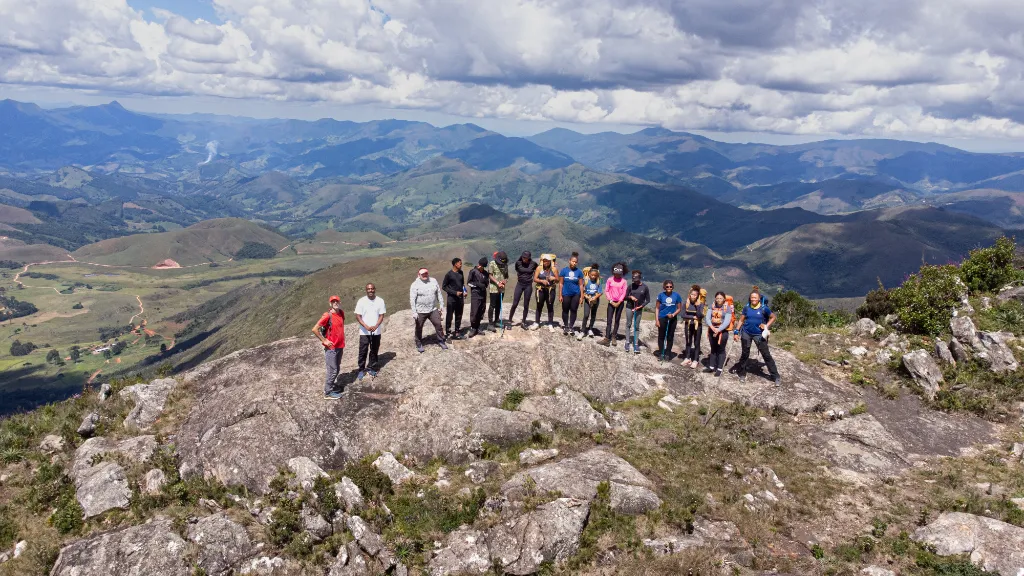
Aretha Duarte, Favela Radical and Outward Bound Brasil – Photo: Abelardo Walsh
In 2023, the mountaineer built a sustainable open and free climbing wall in Parque Linear do Mingone, in Jardim do Capivari, the outskirts of Campinas, where she was born, raised, and still lives. “Some people don’t believe in their potential because of lack of opportunities, structure, social, economic, educational, or health issues. But as we lead these people to access sports or education, they feel more empowered, more like they belong, and more capable of living this amazing life full of opportunities, especially in nature. My motivation is to give access opportunities.”
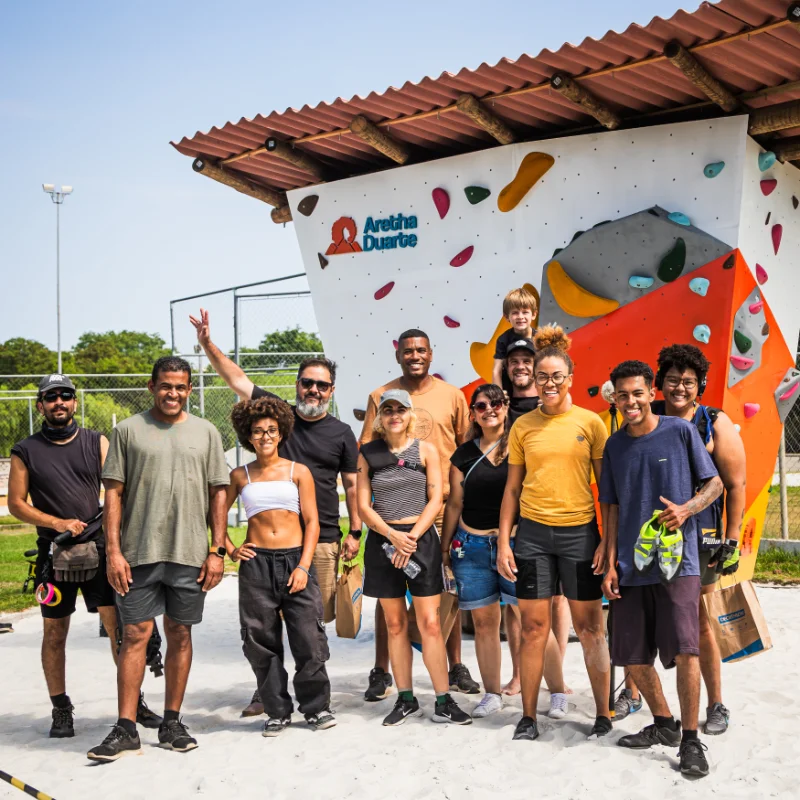
Sustainable climbing wall in Campinas/SP. Photo: Rosita Belinky
In 2024, during Black Consciousness Month, Aretha led an exclusive expedition for Black people to Kilimanjaro in Tanzania. “It was a proposition to allow Black people from Brazil to practice high-mountain activities abroad, precisely because I didn’t want to be the only one.”
The Sankofa Expedition — which means “return to ancestry” — was an opportunity not only to climb but to immerse the group in Tanzanian culture, a chance to reconnect ancestrally with their history. “We felt at ease, among brothers and sisters, as Black people. We understood the value of identity, belonging, and beauty. We came back fulfilled, uplifted, and empowered, proud of our history and who we are.”
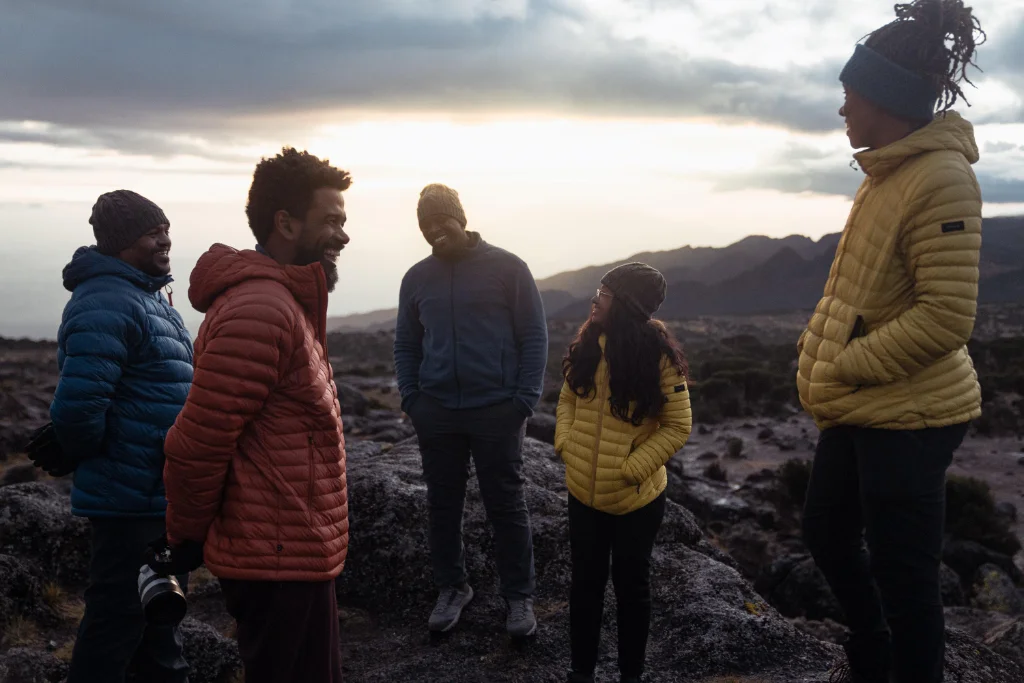
At Kilimanjaro, in 2024. Photo: Gabriel Tarso.
By inspiring and empowering people through her work and strength, Aretha sets an example for everyone to do their part in promoting inclusion. “The responsibility is on all of us. We can encourage people to always foster mountaineering however they can, whether by leading an activity they know, investing in social projects, buying a mug, a raffle ticket to support the projects, or contributing to a crowdfunding campaign.”
Aretha emphasizes that inclusion and diversity benefit the whole of society. “That way, we’re all connected to promote a better world, ensuring a future with collective results. So, I’d like to invite everyone to this co-responsibility. The world and the change we want to depend on all of us.”
‘I Want to Bring Climbing to the Vila Olímpica neighborhood’
As a final message, guide and mountaineer Ariel Silva encourages Black people to believe in the enormous strength they carry in building their paths and stresses that honoring their stories and daily efforts is as important as the technical skills to be in nature activities.
“When I face a challenge in the mountains, I close my eyes and see how strong I am for everything I’ve been through and what people in my community go through. I can see myself in all of them. My strength is in these images: I see the favela where I was born and the people I can’t bring with me. That energy drives me and makes me pursue what I want.”
And what he wants is huge: to bring climbing to the Vila Olímpica neighborhood and train guides from the outskirts. But facing financial challenges, he does what he can — and it’s not little. Once a month, Ariel teaches a climbing course for people from the community and takes them into nature with subsidies within the client groups he guides.
This post is also available in: Português (Portuguese (Brazil)) Español (Spanish)
